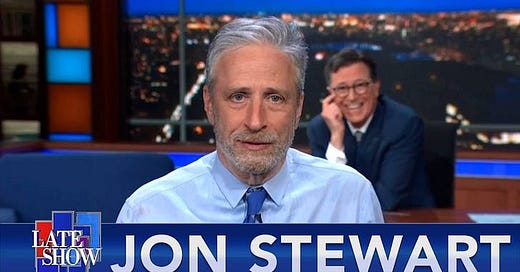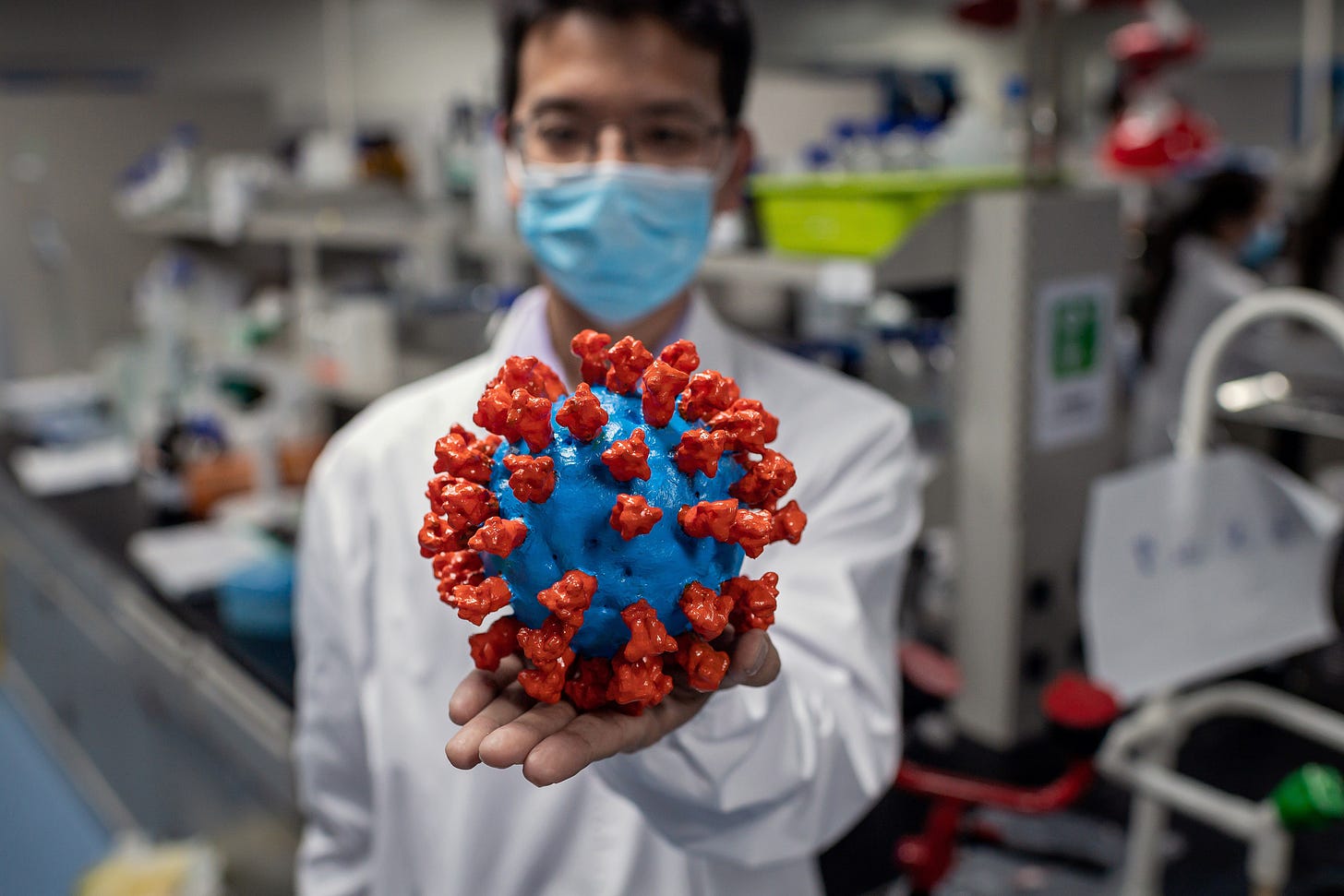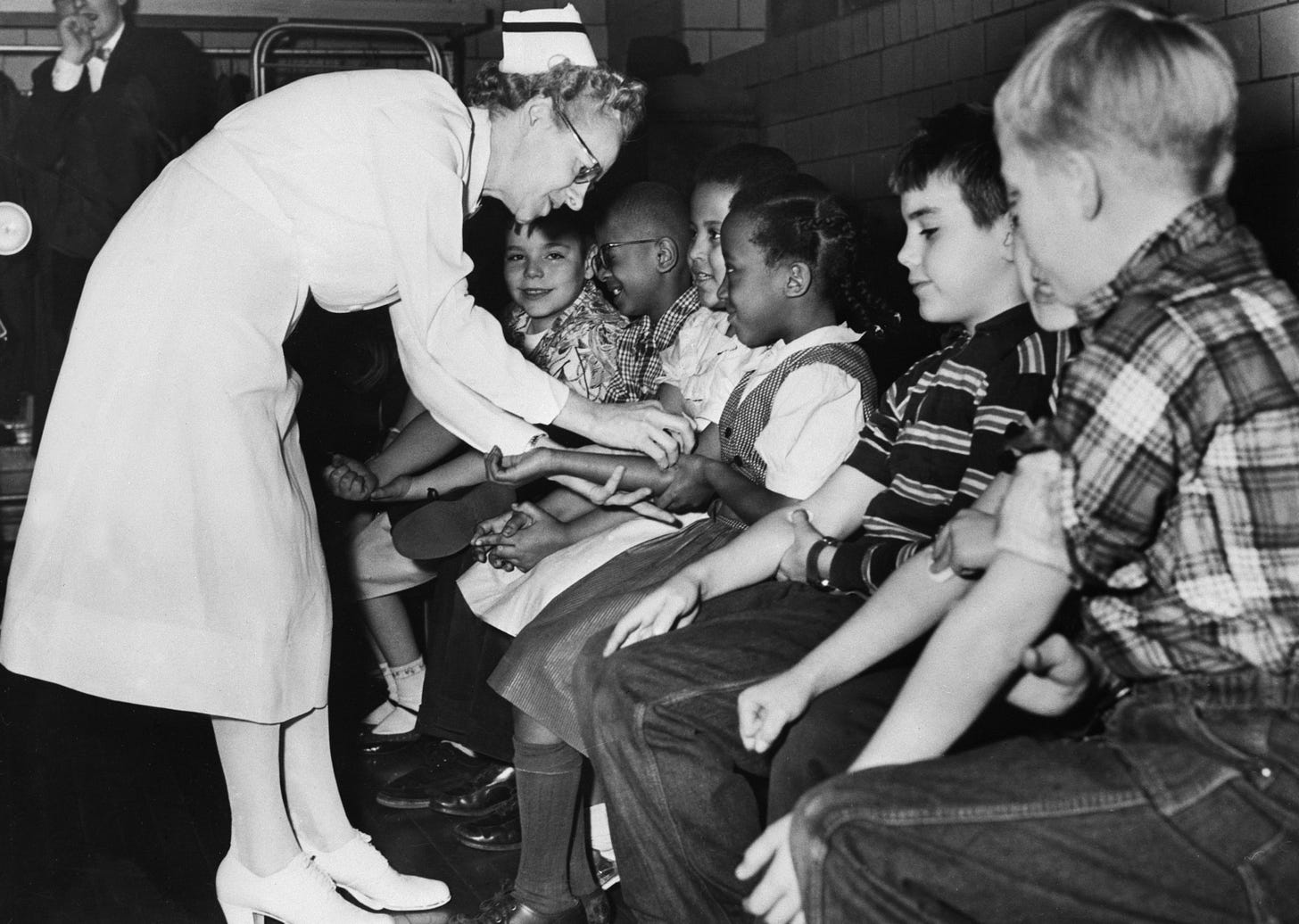That America is getting back to a life we once recognized, of dinners with friends and family, of bus trips and movie theaters, of Broadway shows and an in-person business meeting, is a testimony to the power of science.
I have written before about these amazing vaccines under the heading Yay, Science. But I feel the need to return to this topic in the wake of a movement to demonize science and scientists that is growing in this country, and around the world. Legitimate questions are being taken to absurd and dangerous extremes. The process of science is being misrepresented — either deliberately or due to ignorance. And this isn’t just the work of cynical operatives on the political right.
This Monday, comedian Jon Stewart went on The Late Show with Stephen Colbert. It was a big moment, and not just because the old friends were reunited. This was the first Late Show in front of a live audience in more than a year. The crowd — all vaccinated — was packed to capacity, ready for a night to remember what we lost. Most didn’t wear masks.
With this as the backdrop, Stewart had something he wanted to say about the pandemic, and science. “I honestly mean this: I think we owe a great debt of gratitude to science,” Stewart began. I do not believe most people hearing this in real time expected he would go where he eventually did. But go there he went. “Science has in many ways helped ease the suffering of this pandemic ― which was more than likely caused by science.” From there Stewart unleashed a rant, couched in his familiar style of humor, about his conclusion that the theory COVID came from a Chinese lab in Wuhan was a certainty. He added, “Oh my God, there’s a novel respiratory coronavirus overtaking Wuhan, China. What do we do? Oh, you know who we could ask? The Wuhan novel respiratory coronavirus lab.”
Now, this needs to be put in the correct context. It is true that, early in the pandemic, many if not most scientists dismissed the notion that the virus leaked from a lab. A year and half later, the origins of the virus remain a mystery and China has been far from forthcoming — to say the least — about what they know, and did. It is also true that more scientists are considering the lab theory as worthy of examination, although there is no specific evidence to date that it is the source. Furthermore, it seems that most virologists do not think that the virus has the chemical fingerprints of human engineering. But that could be perhaps a possibility. We just don’t know. And we need to try to find out, letting the facts lead wherever they may.
All this underscores a simple truth: science, nature, the universe, is complicated. What we have seen in this pandemic is the public witnessing scientific research in real time. Scientists will be the first to tell you that a lot of what they initially think, their hypotheses, turn out to be wrong. That is what experimentation is for. That is what data is for. We learn from our failures as well as our successes. At first we got guidance that COVID was spread largely on surfaces, even as some scientists were warning early on about it being aerosolized. We eventually got mask mandates. Many researchers felt that that came too late. This is not a sign of good faith or bad faith. Science isn’t faith. It’s about teasing out what we know, and pivoting our thinking when we learn something new. Scientists, especially in the early stages of examining a phenomenon (like a deadly virus they haven’t seen before), often disagree.
There could have been a world where our political leadership at the time explained this process, where they helped guide the public through what we knew and didn’t know, differentiating between points of confidence and uncertainty. Instead, they chose a different path and did not listen to the science as it emerged and coalesced. They played games with the data. They spread lies and misinformation. They wished the problem would disappear by magic. And now that we have suffered hundreds of thousands of deaths, many of them preventable if we had followed what the scientists were telling us, these same forces want to attack researchers like Dr. Fauci to paint him as the enemy and distract from their own folly. We can expect that from the supporters of Donald Trump, but the words of Jon Stewart and many who share his politics show that this is not an issue that cuts neatly along partisan lines.
On The Late Show, Stewart didn’t leave his criticism of science and scientists at COVID and lab leaks. He extrapolated. “Can I say this about scientists?” he added. “I love them and they do such good work but they are going to kill us all.” Let that sink in. Scientists are going to “kill us all?” And he finished up by predicting how the world would end. “The last words man utters are somewhere in a lab a guy goes, ‘Huhuh! It worked.’”
I cannot overemphasize how dangerous this line of thinking is. It is true that some scientists have done some bad things in the name of research — such as the Tuskegee experiments. Scientists have been wrong. Science and technology have been tools that supported colonialism and oppression. Science does not release us from our moral responsibilities. All of this is the case because science is a human endeavor and scientists are human, subject to the same frailties and base instincts as any member of our species. But science is also a way of thinking, where we challenge our own dogmas and beliefs, where we change our minds and approach when the data show we were wrong.
Stewart is playing into the trope of the mad scientist at a time when we need science more than ever to solve our more pressing problems — most notably climate change. The idea that science is the biggest threat to the planet is terribly irresponsible. It gives free license to all those who say, “forget what we have learned, forget knowledge, forget seeing reality.” And I fear this reasoning - or should I say “unreasoning” — has not only consumed the modern Republican party but is in danger of consuming an even broader swath of the American and global public.
We need to investigate the origin of the virus, but we cannot let that overwhelm all the other elements of the story. We have seen deadly pathogens in the past, and we will see them again. Most, if not all, will come from nature. We will need to figure out how to limit their spread. We will need vaccines and public health measures. We will need to learn from what we did wrong with this outbreak and make our next response more effective. This is how progress works. This is how science can help us build a more secure future.
I am old enough to remember when childhood was plagued by horrible diseases that have now been almost completely eliminated by vaccines. I remember when cancer was an automatic death sentence. I remember when we couldn’t imagine going to distant planets. I remember when we didn’t understand how our climate worked. I remember times when we were less knowledgeable and prepared, until science helped open our eyes. At the same time, I know that science itself is not a substitute for morality or public policy. It is a method for us to understand the choices we might have to make.
What we need is to teach people what science is, and what it is not. We need to show how the process of discovery works, how ideas are tested and sometimes found to be wrong. We need to investigate such stories like the origins of the virus. But we need to put that into the context of life on the planet, our interconnectedness, and all the other factors that shaped this pandemic. We need to embrace science as a quintessentially human endeavor, our instinct as a species to cross horizons of knowledge and experience. Like all of our actions there is a fine line between benefit and harm. So we must strive to create structures and systems of government and society that promote the former and minimize the latter. That does not include fanning the flames of ignorance or demonizing scientists who are dedicating themselves to opening our collective minds to information and data and have done so much to lessen the suffering of the human condition.
I don’t think the world ends with a guy in a lab saying, “huh, it worked.” It ends with a society, high on its own hubris, closing its minds to nuance, knowledge, and understanding. And that’s not a laughing matter.
—Dan and Steady Team
I hope to continue to build a community here on Steady. If you aren’t already a subscriber, please consider signing up to a free or paid subscription. And if you are already part of our family, please consider sharing this post — and Steady — with others.





It's disingenuous to lump Stewart and those concerned about the (solid, based in evidence) possibility that COVID 19 was accidentally leaked from a lab with whackadoodle Trump supporters who refuse to believe climate change or evolution exist. The lab leak theory is not anti-science. Lab leaks are how we got such lovely treats as Africanized killer bees (as someone allergic to bees, yes, scientists could kill me if I ever encounter a killer bee swarm.) Only people with simplistic black and white thinking could insist that questioning scientists' lab activities should never happen and that to raise these questions means being anti-science. Jon Stewart didn't villainize science or scientists. He raised very valid points. Scientists are genetically engineering crop seeds that are sterile, for example, to maximize profits to seed companies. What could go wrong there, except wiping out entire plant species? Questioning the way we allow scientists to conduct experiments without more stringent safety measures is not anti-science. It is pro-science. My dad (a physicist) worked in a lab in college that famously accidentally infected many people with polio. This continues to happen because politicians and media figures like you squelch all discussion of public safety. Thank God for scientists. They have made our lives immeasurably better. But without scrutiny and more stringent safety measures, Jon Stewart is correct- they may also accidentally kill us. It's a politically disadvantageous fact, but it is a fact. There needs to be room for nuance in our thinking. We should be able to question things without being raked over the coals by media figures as "unscientific." I mean, I think cars are good, but should be able to question companies' safety standards without being labeled as "anti-car" or question the use of pesticides without being labeled as "anti-farmer." Come on.
Very grateful to all the scientists who helped us. Not so happy that Jon Stewart ranted about a Chinese Lab being responsible. It doesn’t change what happened but it does increase the prejudice against Chinese Americans.